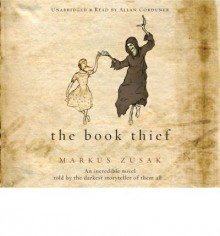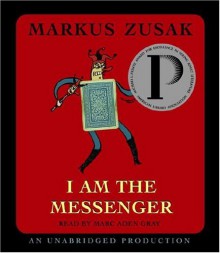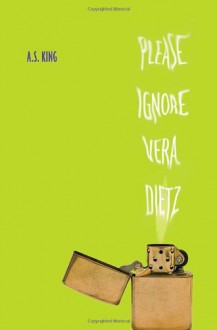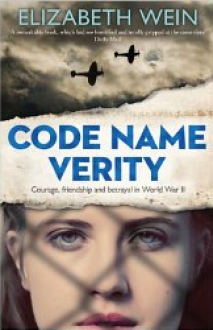
***Note: this review assumes that you've read the book.***
One-sentence summary: An impressive piece of prose and character, marred by some clunky phrasing and a lack of weighty themes.
Honestly, if I were handing out stars, I'd probably give this one five, because of the scope of it, and because the characters truly stick with you. But it does have flaws. Marcus Zusak is so close with the books I've read--so close to greatness, and then there's a slight cave-in and I think, "Is he a bloody genius who loses interest when he's finishing the last 5%, or are his manuscripts hot messes and it already takes a ton of effort to polish them this far?" More likely he's just young and working up to a genuinely stellar career.
Memorable characterization. The characters are strong (if a little bit black and white in their morality), especially Rosa and Hans Hubermann, Rudy, and Liesel. Max is very good, too, despite not having much of a chance to be anything but a heroic tragic figure. I think it's cool that Zusak shows us a town that's not necessarily philosophically pro-Nazi, but scrabbling along in its poverty, joining the Nazi party because it must. And yet he cheats a little in that we never get a sense for how the Jews were integrated in the little town's society before persecution. (Liesel never mentions Jewish friends even from her old home town, as far as I remember. Only Alex Steiner's story mentions Alex's guilty relief that the Jewish tailors are gone, and soon he learns that lack of competition goes hand in hand with the loss of Jews as customers.)
When the story begins, we're dropped in Molching after there's already a ghetto, so we don't have a peek at the pre-holocaust attitudes of our beloved characters (and we don't see the ghetto being emptied, and the town's response to that). We also never see any "gray" characters in the form of likable Hitler Youth or Nazi-party adults. Like Franz and Victor (the boys who tormented Rudy), the bad guys are two-dimensionally horrid, which is sort of...easy? I think Zusak wanted to show that the town is made up mostly of people who are fighting to survive, are not really focusing on others, and are victims of the war, too. (Hans Hubermann's LSE co-workers feel apolitical, for instance, because they're just cleaning up after the devastation; they have no commentary on the cause of the devastation because they don't have the energy.) But for that to be true, for the town to be distractedly oblivious, it would have helped for the town not to have been geographically on the route to and from Dachau. Having starving, emotionally crushed prisoners march down their streets brings up so many issues of what citizens know and are complicit with, and what they don't know and choose to deny. You can't bring it up without dealing with it, and Zusak winds up mostly skirting the issue (other than a couple of definite pro-Nazi townies, like the shopowner who requires a "Heil Hitler" if you want to buy her candy).
The bomb deprives us of an ending. Dumping Liesel off at the Hubermanns after the Jews have already been removed, and ending the story with the obliteration of the town (and almost every character we've come to love) with a bomb before the official end of the war was perhaps Zusak's way of trying to contain the story, but had--like the weird meta-ending of I am the Messenger--the effect of seeming oddly like a cop-out: like Zusak looked at his word count and felt that he'd run 26.2 miles and it was time to finish this marathon. The truncated chronology winds up cutting off two important ends: the town's acceptance of the isolation of the Jews, and the very difficult last two years of the war. And then--plop!--we're reading epilogues about Liesel as an old woman, and about Max who only reappears long enough to hug Liesel in Alex Steiner's shop.
What's the point? I think what nags at me the most is this: what the heck is the point of this book? Who learns anything? If the main character is Death, well, he's too omniscient, too eternal to learn anything. Liesel is a blip in his "life." A blip that matters to him, to be sure, and a person who lives in a time that efficiently encapsulates everything that fascinates and repels him by human beings. But wasn't he demoralized and buoyed by humans when he started the story, and pretty much the same when he ended it? (Small aside about blips: Death says that Liesel "lived to a very old age," and when he collected her soul and showed her the book, "I was finally able to do something I had waited on for a long time." But by my calculations she's 77 when she dies...not terribly old. Life expectancy tables show that if you lived to be 74 in 2003 (Liesel's age in 2003) you could expect to live to be about 87. So by dying at age 77 in 2006, she actually wasn't long-lived for her cohort, statistically. Yes, Death waited 63 years to give her black book back...but what's 63 years to an eternal being?!)
If we think of Liesel as the main character, it's a coming-of-age story, I guess, but what is actually accomplished, thematically for her? Yes, we readers learn the hopelessness and unpredictability and fickleness of life. We're made aware of the (somewhat trite, when it's told--in so many words--again and again) contrapposto of "beauty and brutality," and the fact that humans are "so ugly and so glorious" and their words "so damning and so brilliant." But just in terms of literary closure, or in terms of a story arc, what does Liesel learn?
You may argue, does my complaint "What does it all mean?" have any merit? I agree that it's probably a question that academic literary analysis doesn't care about, in favor of, "What meanings can we draw out of the text?" In the end it may not be necessary for characters to be aware of the meanings and changes that take place for the reader to get something out of it. Certainly adult literary fiction doesn't always concern itself with circularity and plot, but popular fiction does.
Odd prose choices. I'm seeing a pattern with Zusak where he strives so hard for descriptive prose that it sounds clunky or strained and snaps you out of the story. Or perhaps he's trying to emulate Fitzgerald's kooky descriptive terms (the online interpretations of the phrase "non-olfactory money" in The Great Gatsby go through a lot of linguistic calisthenics to show how quirkily beautiful it is, but to me it sounds like a dud). Here are a few of Zusak's:
A breakfast-colored sky.
A disfigured figure...
Pine cones littered the ground like cookies...
There were wooden teardrops and an oaky smile.
And finally, I couldn't believe the last line of The Book Thief. Aaargh! Directly plagiarized from Norman Maclean's A River Runs Through It:
I am haunted by humans.
In Maclean's novel the last line is: "I am haunted by waters." It's possibly one of the most moving lines in literature. Did Zusak think no one would notice?! (Maybe he intended it as "homage." But...just...please don't.)

 Log in with Facebook
Log in with Facebook 








